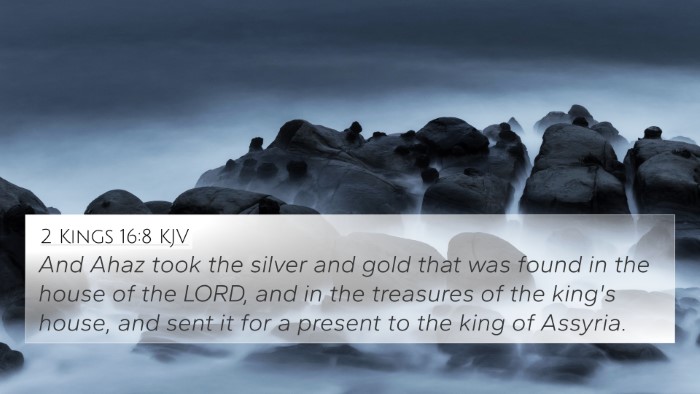Understanding 2 Chronicles 28:21
2 Chronicles 28:21 states: "For Ahaz took away a portion out of the house of the Lord, and out of the house of the king, and of the princes; and gave it unto the king of Assyria: but he helped him not." This verse highlights the folly of King Ahaz in choosing to rely on external powers rather than trusting in God.
Summary of the Verse
This passage reveals Ahaz's poor decision in seeking assistance from the Assyrian king, which ultimately did not yield the help he sought. It demonstrates the futility of looking to worldly powers instead of depending on divine aid.
Commentary Insights
- Matthew Henry's Commentary: Henry emphasizes the historical context, noting that Ahaz’s actions were driven by panic and lacked faith in God. He remarks on the tragic irony that Ahaz sacrifices sacred things in pursuit of temporary military alliances.
- Albert Barnes' Notes: Barnes explains the importance of the offerings taken from the temple. He notes that Ahaz's attempt to secure support was misguided, as it not only exemplified his distrust in God but also diminished the sacredness of the temple's resources.
- Adam Clarke's Commentary: Clarke offers an analysis of Ahaz's character, painting him as a king steeped in idolatry and unfaithfulness to God. He asserts that Ahaz’s reliance on the king of Assyria reflects the broader theme of Israel's errors in seeking out foreign alliances rather than relying on God.
Thematic Connections
The verse connects with a broader biblical theme concerning trust in God versus reliance on human solutions. Ahaz's failure serves as a cautionary tale about the dangers of misplaced trust.
Biblical Cross-References
To further understand the implications of 2 Chronicles 28:21, consider the following cross-references:
- Isaiah 7:1-9: This passage discusses the context of fear and the promise of God's help amidst threats from foreign nations.
- 2 Kings 16:7-9: This parallels Ahaz's actions and offers insights into his alliances with Assyria.
- Psalms 118:8-9: Emphasizes the trustworthiness of God over man, reinforcing that reliance on God is ultimately fruitful.
- Jeremiah 17:5-8: This verse condemns those who rely on flesh and human strength rather than divine support, echoing Ahaz’s failings.
- Micah 5:5: Speaks to the peace and security found in reliance on the true Shepherd, contrasting Ahaz's poor choices.
- Proverbs 3:5-6: Encourages trust in the Lord rather than one’s own understanding, highlighting the ideal response which Ahaz failed to adopt.
- Isaiah 31:1: Provides a warning against seeking help from Egypt and other nations rather than turning to God for salvation.
Lessons to Take Away
This verse encourages believers to assess their own lives for areas of misplaced trust and reliance on worldly systems. It serves as a reminder of the importance of faith and God's ability to provide for and protect His people.
Conclusion
2 Chronicles 28:21 is a significant verse that serves as a reminder of the consequences of abandoning faith in God for mere human alliances. By engaging with cross-referencing Biblical texts, readers can gain a deeper understanding and learn from Ahaz's mistakes.






